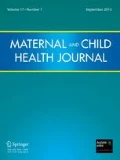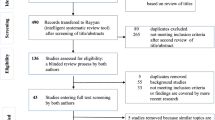Abstract
Background
In a context with strong rhetorical support for breastfeeding in the health system, yet extremely low rates of breastfeeding after hospital discharge, UK women’s decisions about infant feeding reflect the reality of competing priorities in their lives, including obtaining adequate sleep. Popular wisdom in the UK tightly links breastfeeding and inadequate night-time sleep. Mothers are advised by peers and family to introduce formula or solid foods to infants to promote longer sleep.
Objectives
The first objective of this study was to investigate women’s understandings of the nature of infant sleep and their perceptions of links between infant feeding method and sleep. The second was to explore how these perceptions influence infant feeding and sleep practices. Underpinning our work is the understanding that infant care choices result from trade-offs by which mothers strive to balance infant- and self-care.
Methods
We conducted seven focus groups with mothers of infants in two regions of the UK. Verbatim transcripts were thematically coded and emergent themes were identified.
Results
We found clearly diverging narratives between breastfeeding and formula-feeding mothers. Breastfeeding mothers viewed the fragmentary nature of infant sleep as natural, while mothers who were formula feeding felt this was a problem to be fixed.
Conclusions and Practice
The strategies used to promote infant and maternal sleep in each group were aligned with their underlying perception of how infant sleep works. Maternal perceptions of the nature of infant sleep and its relation to infant feeding method impact infant care practices in the first year of life.
Similar content being viewed by others
References
Ball, H. L. (2003). Breastfeeding, bed-sharing, and infant sleep. Birth Issues in Perinatal Care, 30(3), 181–188.
Bartick, M., & Smith, L. J. (2014). Speaking out on safe sleep: Evidence-based infant sleep recommendations. Breastfeeding Medicine, 9(9), 417–422.
Brown, A., & Harries, V. (2015). Infant sleep and night feeding patterns during later infancy: Association with breastfeeding frequency, daytime complementary food intake, and infant weight. Breastfeeding Medicine, Early Online, 10(5), 264–252.
Burgard, S. A. (2011). The needs of others: Gender and sleep interruptions for caregivers. Social Forces, 89(4), 1189–1215.
Chianese, J., Ploof, D., Trovato, C., & Chang, J. C. (2009). Inner-city caregivers’ perspectives on bed sharing with their infants. Academic Pediatrics, 9(1), 26–32.
Clayton, H. B., Li, R., Perrine, C. G., & Scanlon, K. S. (2013). Prevalence and reasons for introducing infants early to solid foods: Variations by milk feeding type. Pediatrics, 131(4), E1108–E1114.
Doan, T., Gardiner, A., Gay, C. L., & Lee, K. A. (2007). Breast-feeding increases sleep duration of new parents. Journal of Perinatal and Neonatal Nursing, 21(3), 200–206.
Doering, J., & Durfor, S. L. (2011). The process of “persevering toward normalcy” after childbirth. MCN The American Journal of Maternal Child Nursing, 36(4), 258–265.
Douglas, P. S., & Hill, P. S. (2013). Behavioral sleep interventions in the first six months of life do not improve outcomes for mothers or infants: A systematic review. Journal of Developmental and Behavioral Pediatrics: JDBP, 34(7), 497–507.
Galbally, M., Lewis, A. J., McEgan, K., Scalzo, K., & Islam, F. M. A. (2013). Breastfeeding and infant sleep patterns: An Australian population study. Journal of Paediatrics and Child Health, 49(2), E147–E152.
Galland, B. C., Taylor, B. J., Elder, D. E., & Herbison, P. (2012). Normal sleep patterns in infants and children: A systematic review of observational studies. Sleep Medicine Reviews, 16(3), 213–222.
Giallo, R., Rose, N., & Vittorino, R. (2011). Fatigue, wellbeing and parenting in mothers of infants and toddlers with sleep problems. Journal of Reproductive and Infant Psychology, 29(3), 236–249.
Goyal, D., Gay, C., & Lee, K. (2009). Fragmented maternal sleep is more strongly correlated with depressive symptoms than infant temperament at three months postpartum. Archives of Women’s Mental Health, 12(4), 229–237.
Gross, R. S., Fierman, A. H., Mendelsohn, A. L., Chiasson, M. A., Rosenberg, T. J., Scheinmann, R., et al. (2010). Maternal perceptions of infant hunger, satiety, and pressuring feeding styles in an urban Latina WIC population. Academic Pediatric, 10(1), 29–35.
Hoddinott, P., Craig, L. C. A., Britten, J., & McInnes, R. M. (2012). A serial qualitative interview study of infant feeding experiences: Idealism meets realism. BMJ Open, 2(2), e000504.
Kennedy, H. P., Gardiner, A., Gay, C., & Lee, K. A. (2007). Negotiating sleep—A qualitative study of new mothers. Journal of Perinatal and Neonatal Nursing, 21(2), 114–122.
Kurth, E., Spichiger, E., Stutz, E. Z., Biedermann, J., Hoesli, I., & Kennedy, H. P. (2010). Crying babies, tired mothers—Challenges of the postnatal hospital stay: An interpretive phenomenological study. BMC Pregnancy and Childbirth, 10, 21.
Lopez, K. A., & Willis, D. G. (2004). Descriptive versus interpretive phenomenology: Their contributions to nursing knowledge. Qualitative Health Research, 14(5), 726–735.
Marchand, L., & Morrow, M. H. (1994). Infant feeding practices: Understanding the decision-making process. Family Medicine, 26(5), 319–324.
McAndrew, F., Thompson, J., Fellows, L., Large, A., Speed, M., & Renfrew, M. J. (2012). Infant feeding survey 2010. Leeds: Health and Social Care Information Centre.
McCoy, R., McKenna, J. J., Gartner, L., Chantry, C. J., Howard, C. R., Lawrence, R. A., et al. (2008). ABM clinical protocol #6: Guideline on co-sleeping and breastfeeding revision, March 2008. Breastfeeding Medicine, 3(1), 38-U50.
Montgomery-Downs, H. E., Clawges, H. M., & Santy, E. E. (2010). Infant feeding methods and maternal sleep and daytime functioning. Pediatrics, 126(6), E1562–E1568. doi:10.1542/peds.2010-1269.
Moon, R. Y., Darnall, R. A., Goodstein, M. H., Hauck, F. R., Willinger, M., Shapiro-Mendoza, C. K., et al. (2011). SIDS and other sleep-related infant deaths: Expansion of recommendations for a safe infant sleeping environment. Pediatrics, 128(5), 1030–1039.
Muscat, T., Thorpe, K., & Obst, P. (2012). Disconfirmed expectations of infant behaviours and postnatal depressive symptoms among parents. Journal of Reproductive and Infant Psychology, 30(1), 51–61.
National Institute for Health and Care Excellence. (2014). Addendum to clinical guideline 37, postnatal care: Routine postnatal care of women and their babies. Clinical guideline addendum 37.1, (pp. 1–85). London: National Institute for Clinical Excellence.
National Institute of Child Health and Human Development. (2014). How can I reduce the risk of SIDS? Retrieved 05/29, 2015, from https://www.nichd.nih.gov/health/topics/sids/conditioninfo/pages/reduce-risk.aspx
Quillin, S. I. M., & Glenn, L. L. (2004). Interaction between feeding method and co-sleeping on maternal-newborn sleep. JOGNN Journal of Obstetric Gynecologic and Neonatal Nursing, 33(5), 580–588.
Redsell, S. A., Atkinson, P., Nathan, D., Siriwardena, A. N., Swift, J. A., & Glazebrook, C. (2010). Parents’ beliefs about appropriate infant size, growth and feeding behaviour: Implications for the prevention of childhood obesity. BMC Public Health, 10, 11.
Rosen, L. A. (2008). Infant sleep and feeding. JOGNN-Journal of Obstetric Gynecologic and Neonatal Nursing, 37(6), 706–714.
Rosenwasser, A. M. (2009). Functional neuroanatomy of sleep and circadian rhythms. Brain Research Reviews, 61(2), 281–306.
Sadeh, A., Mindell, J., & Rivera, L. (2011). “My child has a sleep problem”: A cross-cultural comparison of parental definitions. Sleep Medicine, 12(5), 478–482.
Spencer, R. L. (2008). Research methodologies to investigate the experience of breastfeeding: A discussion paper. International Journal of Nursing Studies, 45(12), 1823–1830.
St James-Roberts, I., Alvarez, M., Csipke, E., Abramsky, T., Goodwin, J., & Sorgenfrei, E. (2006). Infant crying and sleeping in London, Copenhagen and when parents adopt a “proximal” form of care. Pediatrics, 117(6), E1146–E1155.
Tully, K. P., & Ball, H. L. (2013). Trade-offs underlying maternal breastfeeding decisions: A conceptual model. Maternal and Child Nutrition, 9(1), 90–98.
World Health Organization. (2001). Expert consultation on the optimal duration of exclusive breastfeeding. In Conclusions and recommendations. 28 to 30 March. WHO/NHD/01.09, WHO/FCH/CAH/01.24, pp. 1–10. Geneva: WHO.
Acknowledgments
We would like to acknowledge the assistance of Jane Herron and Lucy Firth in carrying out the focus groups. We would also like to thank the leaders of the pre-existing groups that we visited for their organisational support, and all the participants who shared their thoughts during the focus groups for their generosity and time.
Author information
Authors and Affiliations
Corresponding author
Electronic supplementary material
Below is the link to the electronic supplementary material.
Rights and permissions
About this article
Cite this article
Rudzik, A.E.F., Ball, H.L. Exploring Maternal Perceptions of Infant Sleep and Feeding Method Among Mothers in the United Kingdom: A Qualitative Focus Group Study. Matern Child Health J 20, 33–40 (2016). https://doi.org/10.1007/s10995-015-1798-7
Published:
Issue Date:
DOI: https://doi.org/10.1007/s10995-015-1798-7




